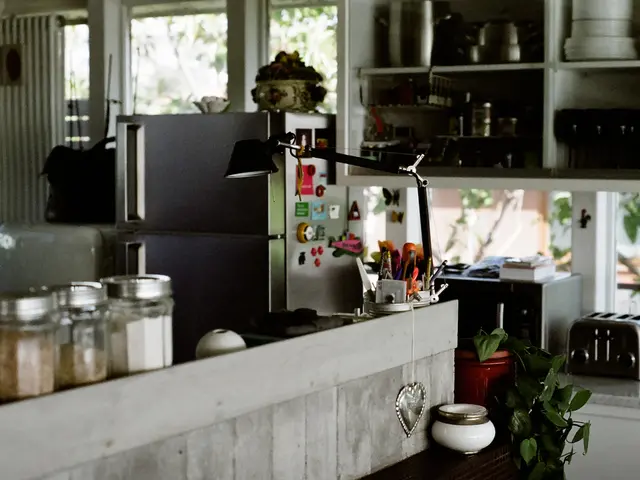Kitchen Islands: Designers Weigh In On Their Waning Popularity
The heart and soul of many homes? The kitchen island! For years, this versatile space has been the center of our kitchens, offering not just improved functionality, but also a gathering place for families and friends. But is this kitchen mainstay still relevant in today's modern homes? With new trends and changes in how we use our kitchens, you might wonder if islands should stay or go.
Modern kitchen island ideas are evolving, and their role is no longer cast in stone. With our kitchens becoming increasingly sociable spaces, the island might not be as crucial for communication and bonding as you'd think. Instead, banquette seating, bistro tables, and smaller breakfast bars are becoming increasingly popular.
Another shift comes from the trend toward closed-concept spaces. For the last several decades, open-plan kitchens with plenty of room have ruled design wishlists. However, there's been a growing movement toward "broken-plan" kitchens – spaces that feel open and airy while still having distinct zones. In these layouts, a traditional island doesn't really fit the bill.
So does that mean islands have had their day? Are they ruining today's kitchen designs by breaking up the room's flow? While opinions differ, there's no denying that our relationship with kitchen islands is changing.
Simon Ribchester, head of design at Beams, cautions against forcing an island into a space that's too small or narrow. "When squeezed into small or narrow kitchens, islands can end up doing the opposite of what they're intended for – blocking movement, breaking up sightlines, or making everything feel cramped." A well-designed island, on the other hand, can transform the look and function of your kitchen by offering a place for prepping, eating, working, and gathering, often simultaneously.
Beams, founded in 2022, specializes in home renovation while maintaining an eco-friendly approach. By streamlining the entire renovation process, from planning and design to finding reliable contractors, Beams helps homeowners and contractors make smart, environmentally-friendly choices during renovation, reducing carbon emissions and improving energy efficiency.
The debate over kitchen islands rages on, with both sides presenting compelling arguments. Those in favor value the convivial atmosphere islands create and their practical advantages, such as extra storage, prep space, and improved workflow by seamlessly connecting key areas like the stove, sink, and fridge.
However, critics argue that islands can be disproportionate to small or awkwardly shaped spaces, leading to frustration and diminishing the effectiveness of the design. In certain cases, more versatile alternatives like prep tables, modular kitchen peninsulas, or integrated breakfast nooks may be preferable.
DeVOL, founded in 2001, is a renowned kitchen design firm known for creating one-of-a-kind kitchens. Their creative director, Helen Parker, has played a significant role in developing the company's look, style, and voice, as well as its beautiful imagery, writing for brochures and the website, and being featured in national and international press.
Ultimately, the decision to include a kitchen island in your design boils down to your personal preferences, the size of your kitchen, and how the space will be used. Many designers still consider the island a key element in a well-designed kitchen, especially when it's thoughtfully planned and brings added functionality, aesthetic appeal, and a touch of creativity to the space.
Remember, the trends and needs of kitchen island design are evolving. Gone are the days of bulky, built-in islands. Today, we prioritize versatile alternatives that offer flexibility, storage solutions, and smart seating options, such as adjustable-height surfaces, freestanding work tables, and integrated banquette seating.
In summary, the kitchen island remains a valuable design feature in 2025, given its versatility, storage potential, and socializing capabilities. With contemporary alternatives like skirted islands and streamlined designs becoming increasingly popular, homeowners can tailor their kitchen island to their unique lifestyle and aesthetic preferences.
- In today's modern homes, the traditional role of the kitchen island is evolving.
- Banquette seating, bistro tables, and smaller breakfast bars are becoming more popular as alternatives to kitchen islands.
- There's a growing trend toward closed-concept kitchen spaces, sometimes referred to as "broken-plan" kitchens.
- Beams, a home renovation company established in 2022, helps homeowners and contractors make eco-friendly choices during renovations.
- The debate over the necessity of kitchen islands continues, with some advocating for their practical advantages and convivial atmosphere.
- Critics argue that kitchen islands can be disproportionate and inefficient in small or awkwardly shaped spaces.
- DeVOL, a kitchen design firm renowned for creating unique kitchens, emphasizes the importance of thoughtfully planning kitchen islands for added functionality and aesthetic appeal.
- Versatile alternatives like adjustable-height surfaces, freestanding work tables, and integrated banquette seating are prioritized in contemporary kitchen island design.







